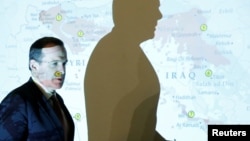The U.S. envoy for the coalition fighting the Islamic State group says the military push to recapture the northern Iraqi city of Mosul is progressing and that the militants are increasingly on the defensive.
"We are doing precision strikes in Mosul almost every day," Brett McGurk said Sunday during a visit to Jordan.
Mosul is Iraq's second-largest city and has been under Islamic State control since the militants swept through the region in mid-2014. The U.S.-led coalition began its airstrikes in August of that year, and regularly includes sites in the Mosul area in its daily reports of attacks targeting the militants.
Iraq's military, which along with pro-government militia groups has been fighting Islamic State militants on the ground, declared its intention to reclaim Mosul but has not launched any major offensive there.
McGurk also described Sunday a propaganda campaign against the extremist group on sites such as Facebook and YouTube involving the governments of Jordan, Malaysia and the United Arab Emirates.
U.S. President Barack Obama made that one of the priorities of the campaign to destroy the militant group, along with cutting off its finances and stopping the flow of foreign fighters to its self-declared Islamic caliphate in Iraq and Syria.
IS leaders 'should be nervous'
McGurk said the coalition is finding and killing Islamic State leaders, and that those who remain are "increasingly nervous and they should be nervous."
The group has made the northern Syrian city of Raqqa its de facto capital, and McGurk said pressure will begin there in the coming weeks and months.
To date, coalition warplanes have conducted more than 12,000 airstrikes against Islamic State targets, while pro-Iraqi forces have managed to take back areas from the militants.
But despite the gains, Iraq has seen the Islamic State group control major parts of its territory for two years now.
In neighboring Syria, the group compounded a civil war that has killed hundreds of thousands of people.
In both countries, the militants have destroyed cultural artifacts they viewed as idolatrous and stand accused of human rights violations, including genocide.





